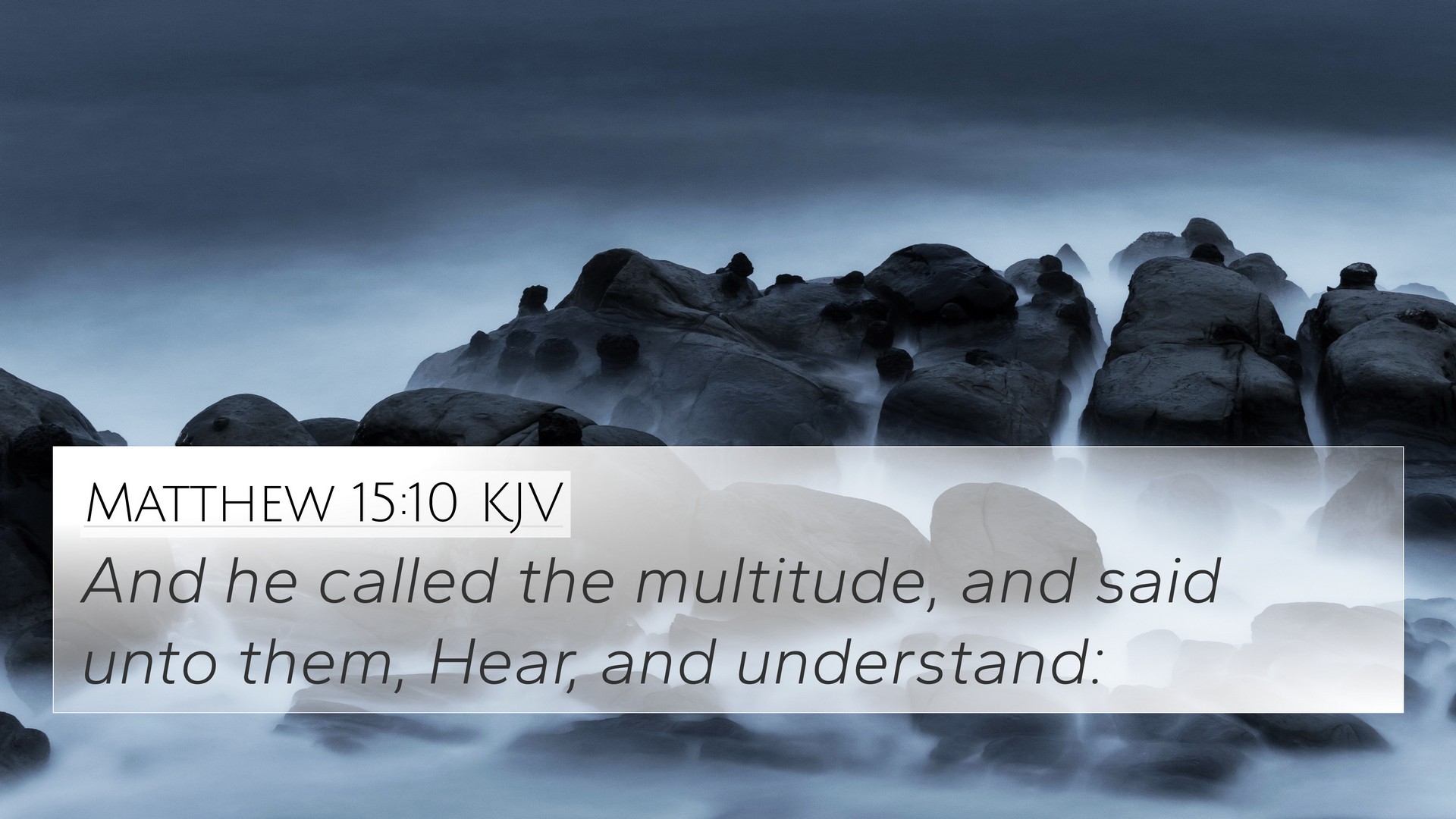Understanding Matthew 15:10
Verse: “And he called the multitude, and said unto them, Hear, and understand:”
In this pivotal verse, Jesus emphasizes the importance of listening and understanding his teachings, a theme echoed throughout the Gospels.
Commentary Insights
Matthew Henry Commentary
Matthew Henry suggests that this verse is an invitation for all to gather and comprehend the profound truths that Jesus imparts. He emphasizes that hearing is not enough; understanding is crucial. This establishes the foundation for spiritual growth and wisdom.
Albert Barnes Commentary
Albert Barnes highlights that Jesus is directing his message to the crowd, implying that the teachings are accessible to everyone. He focuses on the need for the listeners to be receptive and discerning, drawing a connection between active listening and spiritual enlightenment.
Adam Clarke Commentary
Adam Clarke elaborates on the fact that the call to “hear” indicates a deeper engagement with the message. Clarke suggests that understanding comes through contemplation and reflection on the teachings of Christ, which leads to a transformative faith experience.
Bible Verse Cross-References
This verse relates to several other scriptural texts that reinforce its message:
- Proverbs 4:1: “Hear, O children, the instruction of a father, and attend to know understanding.”
- Luke 8:8: “And other fell on good ground, and sprang up, and bare fruit an hundredfold. And when he had said these things, he cried, He that hath ears to hear, let him hear.”
- Isaiah 1:18: “Come now, and let us reason together, saith the Lord: though your sins be as scarlet, they shall be as white as snow.”
- James 1:19: “Wherefore, my beloved brethren, let every man be swift to hear, slow to speak, slow to wrath.”
- Revelation 2:7: “He that hath an ear, let him hear what the Spirit saith unto the churches.”
- John 10:27: “My sheep hear my voice, and I know them, and they follow me.”
- Matthew 13:9: “Who hath ears to hear, let him hear.”
- 1 Corinthians 2:14: “But the natural man receiveth not the things of the Spirit of God: for they are foolishness unto him: neither can he know them, because they are spiritually discerned.”
- Psalms 119:34: “Give me understanding, and I shall keep thy law; yea, I shall observe it with my whole heart.”
- Romans 10:17: “So then faith cometh by hearing, and hearing by the word of God.”
Thematic Connections
The themes within Matthew 15:10 echo throughout the Scriptures, inviting readers to explore:
- The Importance of Hearing: Emphasized in various verses like Luke 8:8, indicating that true spiritual insight requires more than merely listening.
- Understanding God's Word: A recurring theme, where Proverbs and Psalms encourage believers to seek understanding actively.
- Spiritual Discernment: Reflected in James 1:19, which urges believers to be thoughtful and patient in their understanding.
- The Call to Action: Many verses, including Revelation 2:7, reinforce that hearing must lead to action and obedience.
- Faith Through Hearing: Highlighted in Romans 10:17, indicating that faith is cultivated through engaging with the Word.
Cross-Referencing Biblical Texts
Cross-referencing offers a remarkable way to deepen our understanding of scripture. The connections drawn among various verses concerning the need for understanding allow believers to discover the cohesive message woven throughout the Bible. Engaging with tools for Bible cross-referencing such as a Bible concordance or a Bible reference guide can enrich personal study and sermon preparation.
Conclusion
Matthew 15:10 serves as an essential reminder of the necessity for believers not only to hear the teachings of Christ but to strive for a profound understanding of their implications. By examining this verse alongside its cross-referenced companions, we can uncover a richer tapestry of meaning that highlights God's desire for his people to engage with His Word fully.
Final Thoughts
As we refine our approach to spiritual growth, leveraging Bible cross-reference systems and employing cross-referencing study methods can empower our understanding of scripture. Through these methods, believers are better equipped to interpret Biblical themes and draw meaningful connections that align with their faith journey.













